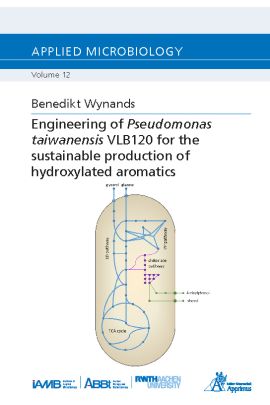Aromatics are valuable compounds with a myriad of applications and display an indispensable cornerstone of modern society. Their vast majority is produced from non-renewable resources in petrochemical processes, implicating many negative aspects associated to the exploitation of oil. Aromatics production based on whole-cell biocatalysis would contribute to a more sustainable bioeconomy. However, the inherent toxicity of many aromatics hampers microbial production. Due to their robustness and intrinsic protective mechanisms towards aromatics, Pseudomonads are promising hosts for the production of these chemicals.
In this thesis, solvent-tolerant Pseudomonas taiwanensis VLB120 was applied as microbial cell factory for the production of hydroxylated aromatics from renewable feedstocks. In this context, Pseudomonas was extensively engineered to redirect the carbon flux into the shikimate pathway and yield de novo-synthesized tyrosine as common precursor. The modular implementation of product-specific pathways allowed high-yield production of phenol and 4 vinylphenol that were chosen as paradigms of toxic and industrially relevant aromatics. For phenol and 4 vinylphenol the highest reported yields were achieved in a mineral medium without the supplementation of any complex additives.
In addition to the metabolic engineering work, streamlined chassis strains of P. taiwanensis VLB120 were generated by the targeted elimination of dispensable and unfavorable cell elements. Thereby, the genome was reduced by up to 10%. The resulting strains showed increased key performance indicators, including enhanced growth rates and biomass yields. For the process-guided application of custom-tailored strains according to a chassis à la carte principle, we generated streamlined strains only varying concerning their solvent tolerance level resulting from different expression of the solvent efflux pump TtgGHI. To profit from the chassis strains’ superior performance, they were engineered for the production of phenol and 4 vinylphenol, thereby further increasing the titer, yield, and volumetric rate of production.
Altogether, this thesis contributed to the fundamental understanding of aromatics metabolic pathways and solvent tolerance in P. taiwanensis, which further strengthens the role of P. taiwanensis VLB120 and the genome-reduced chassis as industrial workhorse.
| Autor | Wynands, Benedikt |
|---|---|
| Lieferzeit | 3-4 Tage |
| Gewicht | 0.286 kg |
| Erscheinungsdatum | 13.05.2019 |
Applied Microbiology
Engineering of Pseudomonas taiwanensis VLB120 for the sustainable production of hydroxylated aromatics
Kurzbeschreibung
Aromatics are valuable compounds that are currently produced from non-renewable resources in polluting processes. In this thesis, we engineered solvent-tolerant Pseudomonas for the bio based production of model aromatics of industrial relevance. In this context, high-yield phenol and 4 vinylphenol production was achieved from renewable substrates. The knowledge gained contributes to the development of efficient biocatalysts needed for a sustainable bioeconomy.

